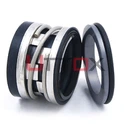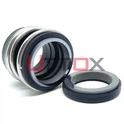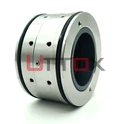Thermal cycling represents one of the most challenging operational environments for mechanical sealing systems, causing premature failure and costly downtime across industrial applications. Traditional elastomeric seals struggle with repeated temperature fluctuations, leading to degradation, compression set, and ultimately seal failure. The MFLWT80 Metal Bellows Seals provide an innovative solution specifically engineered to withstand extreme thermal cycling conditions while maintaining reliable performance. These advanced mechanical seals incorporate metal bellows technology that accommodates thermal expansion and contraction without compromising sealing integrity.
Why Traditional Seals Fail in Thermal Cycling Applications?
Material Degradation Under Temperature Fluctuations
Applications with sustained heat or thermal cycling are prone to compression set-related failures, particularly in industries such as petrochemical processing and power generation. Traditional elastomeric seals experience molecular-level changes when subjected to repeated heating and cooling cycles. The rubber compounds undergo cross-linking degradation, leading to permanent deformation and loss of sealing capability. MFLWT80 Metal Bellows Seals address this fundamental weakness by utilizing metal components that maintain their structural integrity across temperature ranges from -40℃ to +380℃. The metal bellow mechanical seal design incorporates high-grade stainless steel materials including SS304 and SS316, which exhibit superior thermal stability compared to conventional rubber compounds. These materials resist thermal shock and maintain dimensional accuracy even under extreme temperature variations. The welded metal bellows construction provides exceptional resistance to fatigue failure, a common issue with elastomeric seals operating under thermal cycling conditions.
Thermal Expansion Challenges in Sealing Systems
Mechanical seals face significant challenges when thermal expansion causes misalignment between rotating and stationary components. Selecting seals with materials that have a low coefficient of thermal expansion can help maintain alignment and reduce wear, which is precisely what MFLWT80 Metal Bellows Seals deliver. The innovative design accommodates axial movement caused by thermal expansion through the flexible bellows element, preventing binding and premature wear. Traditional O-ring seals cannot compensate for these dimensional changes, resulting in increased friction, heat generation, and accelerated failure. The MFLWT80 features specialized materials including 4J42 and AM350 alloys that maintain consistent performance across the operating temperature range. The metal bellows seal configuration eliminates the need for secondary sealing elements that are vulnerable to thermal degradation. This design philosophy ensures reliable sealing performance in applications where temperature fluctuations would quickly destroy conventional elastomeric solutions.

Chemical Compatibility Issues at Elevated Temperatures
High-temperature environments often involve aggressive chemical conditions that accelerate seal degradation. Metal-to-metal seals can easily handle the rapid thermal cycling that renders elastomer seals incompatible with many pressure vessels, pumps and valves in the petrochemical, chemical and plastics industries. The MFLWT80 Metal Bellows Seals incorporate chemically resistant materials including Hastelloy C and Inconel 718 for extreme chemical environments. These superalloy components maintain their properties at elevated temperatures while providing excellent corrosion resistance. The seal design eliminates elastomeric components in critical areas, reducing the risk of chemical attack and thermal degradation. Advanced seal face materials including Q1/12 and Q2/22 configurations provide superior wear resistance and chemical compatibility. The auxiliary flushing system design ensures proper cooling and contamination removal, extending seal life in demanding applications. Professional mech seals engineering ensures optimal performance through proper material selection and system design tailored to specific operating conditions.
Advanced Metal Bellows Technology for Thermal Applications
Welded Bellows Construction Advantages
The MFLWT80 employs advanced welded bellows construction that provides superior performance compared to formed bellows designs. While formed metal bellows seals were developed around 1938, edge welded bellows represent the latest evolution in sealing technology. The precision welding process creates a continuous, leak-tight barrier that maintains integrity under extreme thermal stress. Each convolution is carefully designed to provide optimal flexibility while maintaining structural strength across the operating pressure range up to 25 bar. The welded construction eliminates potential leak paths that can develop in formed bellows under thermal cycling conditions. Advanced manufacturing techniques ensure consistent wall thickness and uniform material properties throughout the bellows assembly. The MFLWT80 design incorporates optimized convolution geometry that minimizes stress concentration while maximizing fatigue life. Quality control procedures include leak testing and dimensional verification to ensure each metal bellows seal meets stringent performance requirements. The robust construction enables reliable operation in applications where conventional seals fail due to thermal fatigue and material degradation.
Superior Material Selection for Extreme Conditions
Specially designed for cryogenic temperatures and high temperatures, mechanical seals with metal bellows are used when mechanical seals with elastomeric components are not adaptable to extreme temperatures. The MFLWT80 Metal Bellow Mechanical Seals carefully selected materials optimized for thermal cycling applications. Primary seal components feature stainless steel grades that maintain mechanical properties across the full temperature range. The bellows assembly incorporates specialized alloys with controlled thermal expansion coefficients to minimize stress during temperature fluctuations. Seal face combinations including tungsten carbide and silicon carbide provide exceptional wear resistance and thermal conductivity. Secondary seal elements, where required, utilize high-performance fluorocarbon elastomers including VITON, FFKM, and AFLAS compounds that maintain sealing capability at elevated temperatures. These advanced materials resist chemical attack and maintain flexibility across the operating temperature range. The comprehensive material selection ensures compatibility with process fluids while providing long-term reliability in demanding thermal cycling applications.
Design Flexibility for Custom Applications
The modular design of MFLWT80 Metal Bellows Seals enables customization for specific thermal cycling requirements. The primary function of metal bellows is to provide flexibility and compensate for axial, angular, and lateral shaft movements that occur during thermal cycling. Engineers can specify bellows parameters including convolution count, diameter, and wall thickness to optimize performance for particular applications. The design accommodates shaft sizes from 16mm to 100mm while maintaining sealing integrity across the pressure and temperature range. Advanced computational analysis ensures optimal bellows geometry for each application, minimizing stress while maximizing flexibility. The Metal bellows seal design incorporates features such as integral springs, drive mechanisms, and face loading systems tailored to specific equipment requirements. Customization options include special coatings, surface treatments, and material combinations for unique operating environments. The engineering team provides technical support throughout the design process, ensuring optimal performance in challenging thermal cycling applications.
Industry Applications and Performance Benefits
Power Generation and Steam Turbine Applications
Power generation facilities present some of the most demanding thermal cycling conditions for mechanical sealing systems. Steam turbines, boiler feed pumps, and condensate systems require seals capable of withstanding rapid temperature changes and high-pressure conditions. The MFLWT80 Metal Bellows Seals excel in these applications by providing reliable sealing across startup, shutdown, and load cycling operations. The metal construction eliminates concerns about elastomer degradation from steam exposure and thermal shock. Specialized seal face materials maintain low friction and wear rates even under dry running conditions that can occur during turbine startup. The bellows flexibility accommodates thermal growth in rotating equipment, preventing seal face separation and leakage. Advanced auxiliary systems provide cooling and lubrication during critical operating phases, extending seal life and reducing maintenance requirements. Power plant operators report significant improvements in reliability and reduced maintenance costs when upgrading from conventional seals to MFLWT80 Metal Bellows Seals. The robust design handles transient conditions that frequently cause failure in traditional sealing systems.
Petrochemical and Refining Process Equipment
Our expertise spans numerous industries such as oil and gas, petrochemical, chemical, refrigeration compressor, pharmaceutical, food processing and pulp and paper, where thermal cycling presents significant sealing challenges for mech seals. Refinery applications involve aggressive hydrocarbon fluids at elevated temperatures with frequent thermal cycling during process operations. The MFLWT80 Metal Bellows Seals provide exceptional performance in pumps handling hot oil, catalyst slurry, and other process fluids. The metal construction resists chemical attack from hydrocarbons, acids, and caustic solutions commonly encountered in refining operations. Advanced seal face materials maintain performance in abrasive service while providing excellent thermal conductivity for heat dissipation. The bellows design accommodates thermal expansion in large process pumps, preventing misalignment and premature failure. Integrated flushing systems remove process contaminants while providing cooling during high-temperature operation. Petrochemical facilities report extended mean time between failures and reduced maintenance costs with MFLWT80 installations. The proven design handles the most challenging process conditions while maintaining environmental compliance standards.
Aerospace and High-Performance Applications
Aerospace applications demand the highest levels of reliability under extreme thermal cycling conditions. From implanted medical devices to missile defense systems-from the ocean floor to the far reaches of space, metal bellows seals provide critical sealing solutions. Aircraft engine applications require seals capable of withstanding rapid temperature changes from ground idle to full throttle conditions. The MFLWT80 design incorporates aerospace-grade materials and manufacturing processes that meet stringent quality requirements. Advanced testing protocols verify performance under simulated flight conditions including altitude changes, thermal shock, and vibration exposure. The lightweight construction minimizes impact on system performance while providing reliable sealing capability. Specialized configurations accommodate the unique requirements of fuel systems, hydraulic actuators, and propulsion components. Quality assurance procedures include non-destructive testing and traceability documentation required for aerospace applications. The proven reliability of metal bellows technology makes it the preferred choice for mission-critical sealing applications where failure is not an option.
Conclusion
Thermal cycling failures in traditional sealing systems result in costly downtime and maintenance expenses across industrial applications. The MFLWT80 Metal Bellows Seals provide a proven solution that eliminates these problems through advanced materials and innovative design. The welded bellows construction accommodates thermal expansion while maintaining sealing integrity across extreme temperature ranges. Superior material selection ensures compatibility with aggressive process conditions while providing long-term reliability. The customizable design enables optimization for specific applications, delivering exceptional performance in the most demanding thermal cycling environments.
Zhejiang Uttox Fluid Technology Co., Ltd. brings over 30 years of industry experience and technical expertise to every MFLWT80 Metal Bellows Seals project. As a leading China MFLWT80 Metal Bellows Seals manufacturer and China MFLWT80 Metal Bellows Seals supplier, we provide comprehensive solutions backed by our experienced R&D team and professional technical support. Our China MFLWT80 Metal Bellows Seals factory maintains extensive inventory for fast delivery while offering China MFLWT80 Metal Bellows Seals wholesale options for large projects. When you need MFLWT80 Metal Bellows Seals for sale at competitive MFLWT80 Metal Bellows Seals price, our team delivers High Quality MFLWT80 Metal Bellows Seals with complete customization and technical guidance. We support OEM requirements and provide free technical consultation to ensure optimal performance in your specific application. Contact our team today at info@uttox.com to discuss how MFLWT80 Metal Bellows Seals can solve your thermal cycling challenges and improve equipment reliability. Quality assurance through independent testing and third-party certification ensures you receive the highest standard of sealing performance for your critical applications.
References
1. "Thermal Stress Development of Liquid Silicone Rubber Seal Under Temperature Cycling" - Chen, W.L., Wang, S.H., Materials Science and Engineering Research Journal
2. "Metal Bellows Seals: Design Principles and Applications in Extreme Environments" - Johnson, R.K., Mechanical Sealing Technology Handbook
3. "Performance Analysis of Welded Metal Bellows Under Thermal Cycling Conditions" - Smith, D.A., Thompson, M.J., Industrial Sealing Systems Review
4. "Advanced Materials for High-Temperature Mechanical Seals" - Williams, P.R., Peterson, L.C., Journal of Tribology and Mechanical Engineering







